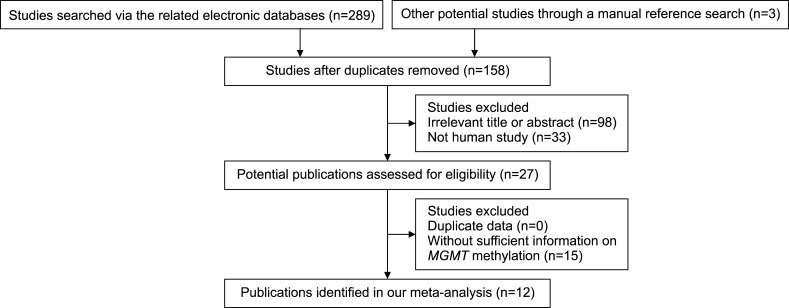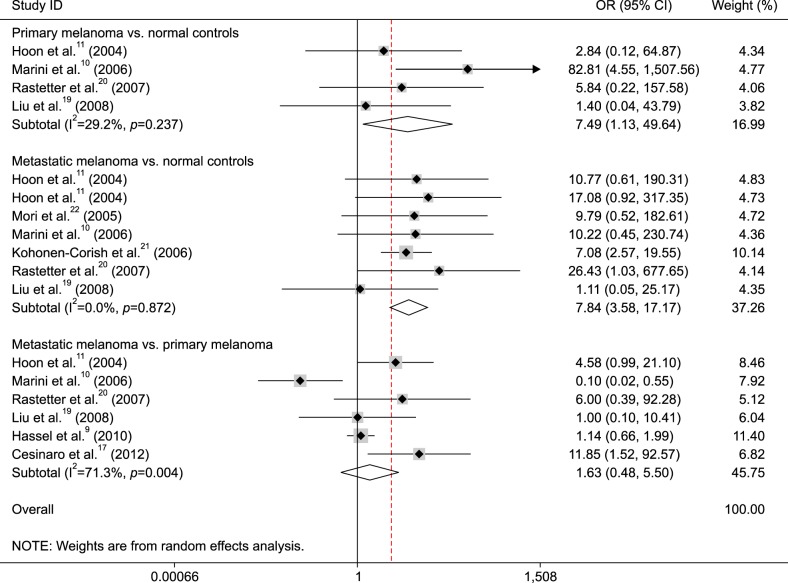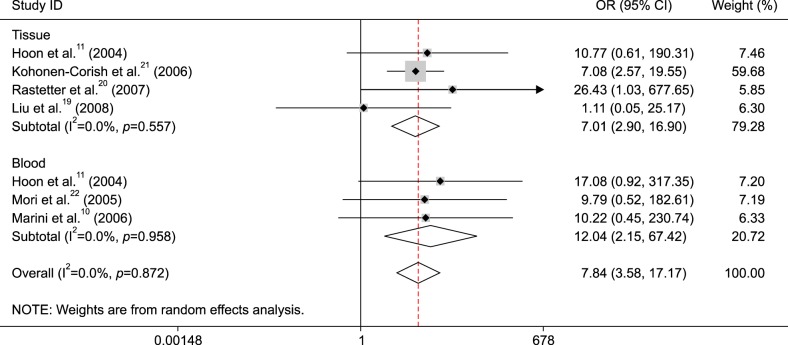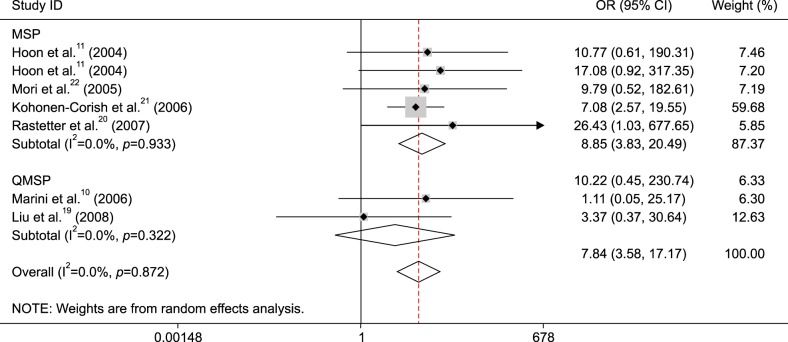Ann Dermatol.
2018 Apr;30(2):129-135. 10.5021/ad.2018.30.2.129.
Clinical and Prognostic Significance of Oâ¶-Methylguanine-DNA Methyltransferase Promoter Methylation in Patients with Melanoma: A Systematic Meta-Analysis
- Affiliations
-
- 1Department of Dermatology, Tianjin First Center Hospital, Tianjin, China. zengsanwu0210@163.com
- 2Department of Pathology, Tianjin First Center Hospital, Tianjin, China.
- KMID: 2414672
- DOI: http://doi.org/10.5021/ad.2018.30.2.129
Abstract
- Tumor suppressor gene Oâ¶-methylguanine-DNA methyltransferase (MGMT) promoter methylation has been reported in melanoma. However, the clinical and prognostic significance of MGMT promoter methylation in patients with melanoma remained to be determined. A systematic search was performed to identify eligible papers published. The overall odds ratios (ORs) or hazard ratios and their 95% confidence intervals were calculated. Final 12 eligible publications involving Caucasian population were performed in this study, including 1,071 metastatic melanoma patients, 154 primary melanoma patients, and 211 normal controls. MGMT promoter methylation was significantly higher in primary or metastatic melanoma than in normal controls (p < 0.05). No difference of MGMT promoter methylation was found in primary and metastatic melanoma (p=0.432). When metastatic melanoma was compared to normal controls, subgroup analysis showed the correlation between MGMT promoter methylation and different sample materials (tissue: OR=7.01, p < 0.001 and blood: OR=12.04, p=0.005). MGMT promoter methylation was not associated with response to drug therapy and the prognosis in overall survival and progression-free survival for multivariate analysis. Our results show that MGMT promoter methylation may be correlated with the increased risk of primary or metastatic melanoma. Based on blood samples, MGMT promoter methylation may become a noninvasive biomarker for the detection of metastatic melanoma. Further additional clinical studies are necessary.
Keyword
MeSH Terms
Figure
Reference
-
1. Leucci E, Coe EA, Marine JC, Vance KW. The emerging role of long non-coding RNAs in cutaneous melanoma. Pigment Cell Melanoma Res. 2016; 29:619–626. PMID: 27606977.
Article2. Berwick M, Buller DB, Cust A, Gallagher R, Lee TK, Meyskens F, et al. Melanoma epidemiology and prevention. Cancer Treat Res. 2016; 167:17–49. PMID: 26601858.
Article3. Sarkar D, Leung EY, Baguley BC, Finlay GJ, Askarian-Amiri ME. Epigenetic regulation in human melanoma: past and future. Epigenetics. 2015; 10:103–121. PMID: 25587943.
Article4. Ye M, Huang T, Ni C, Yang P, Chen S. Diagnostic capacity of RASSF1A promoter methylation as a biomarker in tissue, brushing, and blood samples of nasopharyngeal carcinoma. EBioMedicine. 2017; 18:32–40. PMID: 28396012.
Article5. Paska AV, Hudler P. Aberrant methylation patterns in cancer: a clinical view. Biochem Med (Zagreb). 2015; 25:161–176. PMID: 26110029.6. Gerson SL. Clinical relevance of MGMT in the treatment of cancer. J Clin Oncol. 2002; 20:2388–2399. PMID: 11981013.
Article7. Esteller M, Garcia-Foncillas J, Andion E, Goodman SN, Hidalgo OF, Vanaclocha V, et al. Inactivation of the DNA-repair gene MGMT and the clinical response of gliomas to alkylating agents. N Engl J Med. 2000; 343:1350–1354. PMID: 11070098.8. Beasley GM, Speicher P, Augustine CK, Dolber PC, Peterson BL, Sharma K, et al. A multicenter phase I dose escalation trial to evaluate safety and tolerability of intra-arterial temozolomide for patients with advanced extremity melanoma using normothermic isolated limb infusion. Ann Surg Oncol. 2015; 22:287–294. PMID: 25145500.
Article9. Hassel JC, Sucker A, Edler L, Kurzen H, Moll I, Stresemann C, et al. MGMT gene promoter methylation correlates with tolerance of temozolomide treatment in melanoma but not with clinical outcome. Br J Cancer. 2010; 103:820–826. PMID: 20736948.
Article10. Marini A, Mirmohammadsadegh A, Nambiar S, Gustrau A, Ruzicka T, Hengge UR. Epigenetic inactivation of tumor suppressor genes in serum of patients with cutaneous melanoma. J Invest Dermatol. 2006; 126:422–431. PMID: 16374457.
Article11. Hoon DS, Spugnardi M, Kuo C, Huang SK, Morton DL, Taback B. Profiling epigenetic inactivation of tumor suppressor genes in tumors and plasma from cutaneous melanoma patients. Oncogene. 2004; 23:4014–4022. author reply 933. PMID: 15064737.
Article12. Coory MD. Comment on: heterogeneity in meta-analysis should be expected and appropriately quantified. Int J Epidemiol. 2010; 39:932. PMID: 19349478.
Article13. Higgins JP, Thompson SG, Deeks JJ, Altman DG. Measuring inconsistency in meta-analyses. BMJ. 2003; 327:557–560. PMID: 12958120.
Article14. Lau J, Ioannidis JP, Schmid CH. Quantitative synthesis in systematic reviews. Ann Intern Med. 1997; 127:820–826. PMID: 9382404.
Article15. Tuominen R, Jewell R, van den, Wolter P, Stierner U, Lindholm C, et al. MGMT promoter methylation is associated with temozolomide response and prolonged progression-free survival in disseminated cutaneous melanoma. Int J Cancer. 2015; 136:2844–2853. PMID: 25400033.
Article16. Schraml P, von Teichman A, Mihic-Probst D, Simcock M, Ochsenbein A, Dummer R, et al. Predictive value of the MGMT promoter methylation status in metastatic melanoma patients receiving first-line temozolomide plus bevacizumab in the trial SAKK 50/07. Oncol Rep. 2012; 28:654–658. PMID: 22614944.
Article17. Cesinaro AM, Sartori G, Migaldi M, Schirosi L, Pellacani G, Collina G, et al. Prognostic significance of MGMT gene promoter methylation in differently treated metastatic melanomas. Pathology. 2012; 44:313–317. PMID: 22544212.
Article18. Busch C, Geisler J, Lillehaug JR, Lønning PE. MGMT expression levels predict disease stabilisation, progression-free and overall survival in patients with advanced melanomas treated with DTIC. Eur J Cancer. 2010; 46:2127–2133. PMID: 20541396.
Article19. Liu S, Ren S, Howell P, Fodstad O, Riker AI. Identification of novel epigenetically modified genes in human melanoma via promoter methylation gene profiling. Pigment Cell Melanoma Res. 2008; 21:545–558. PMID: 18627528.
Article20. Rastetter M, Schagdarsurengin U, Lahtz C, Fiedler E, Marsch WCh, Dammann R, et al. Frequent intra-tumoural heterogeneity of promoter hypermethylation in malignant melanoma. Histol Histopathol. 2007; 22:1005–1015. PMID: 17523078.21. Kohonen-Corish MR, Cooper WA, Saab J, Thompson JF, Trent RJ, Millward MJ. Promoter hypermethylation of the O(6)-methylguanine DNA methyltransferase gene and microsatellite instability in metastatic melanoma. J Invest Dermatol. 2006; 126:167–171. PMID: 16417233.
Article22. Mori T, O'Day SJ, Umetani N, Martinez SR, Kitago M, Koyanagi K, et al. Predictive utility of circulating methylated DNA in serum of melanoma patients receiving biochemotherapy. J Clin Oncol. 2005; 23:9351–9358. PMID: 16361635.
Article23. Ye M, Huang T, Ying Y, Li J, Yang P, Ni C, et al. Detection of 14-3-3 sigma (σ) promoter methylation as a noninvasive biomarker using blood samples for breast cancer diagnosis. Oncotarget. 2017; 8:9230–9242. PMID: 27999208.
Article
- Full Text Links
- Actions
-
Cited
- CITED
-
- Close
- Share
- Similar articles
-
- FoxD2-AS1 is a prognostic factor in glioma and promotes temozolomide resistance in a Oâ¶-methylguanine-DNA methyltransferase-dependent manner
- A female adnexal tumor of probable Wolffian origin showing positive O-6-methylguanine-DNA methyltransferase methylation
- Promoter hypermethylation of MGMT (O6-methylguanine-DNA methyltransferase) in cervical squamous cell carcinoma
- Appraisal of re-irradiation for the recurrent glioblastoma in the era of MGMT promotor methylation
- Methylation Status of the O6-Methylguanine- Deoxyribonucleic Acid Methyltransferase Gene Promoter in World Health Organization Grade III Gliomas






